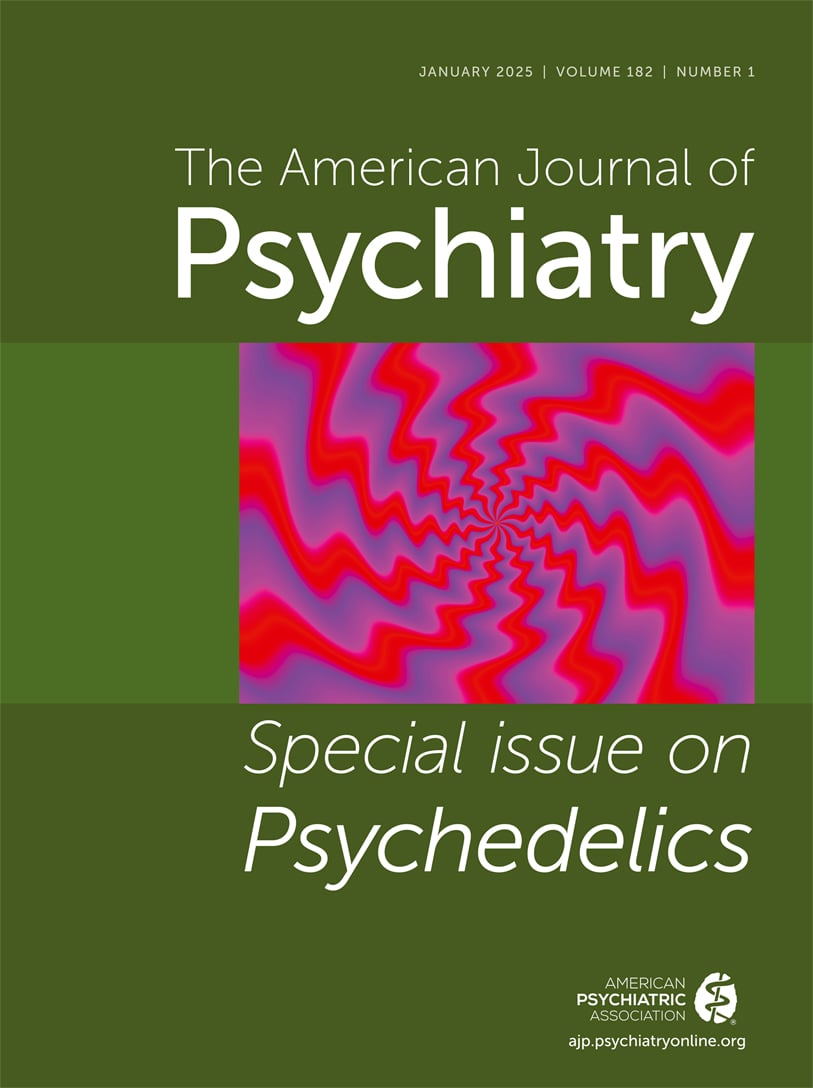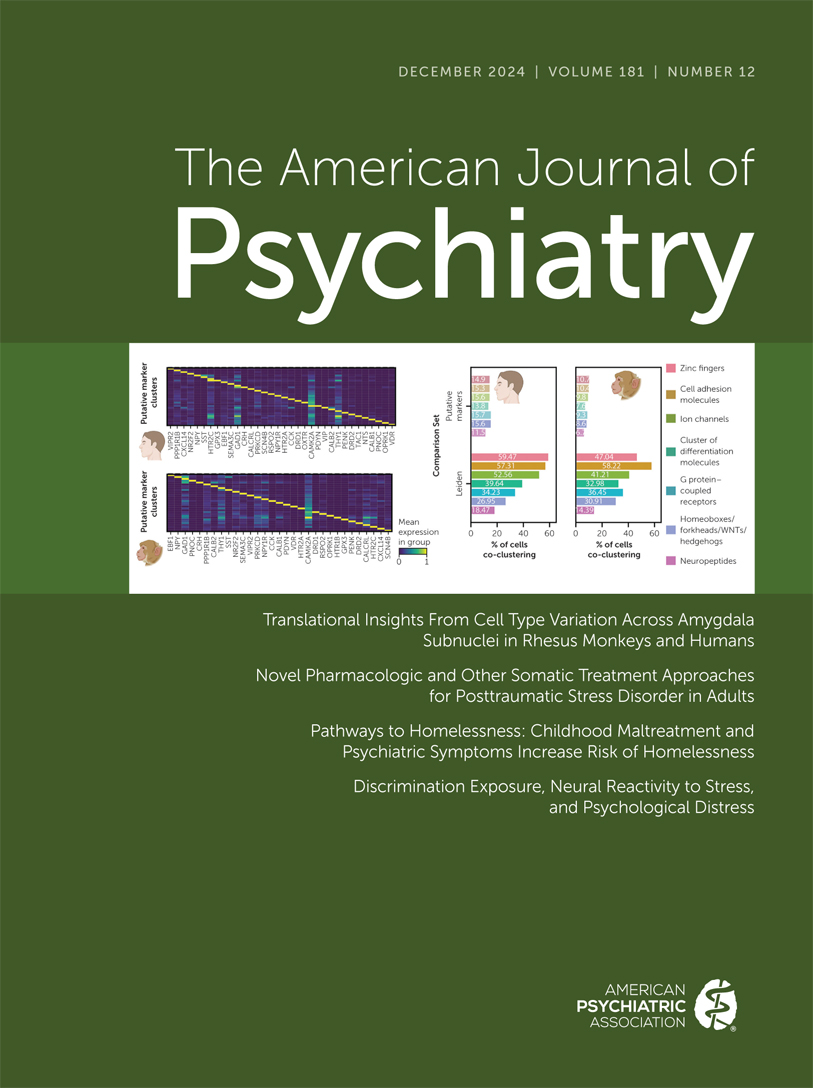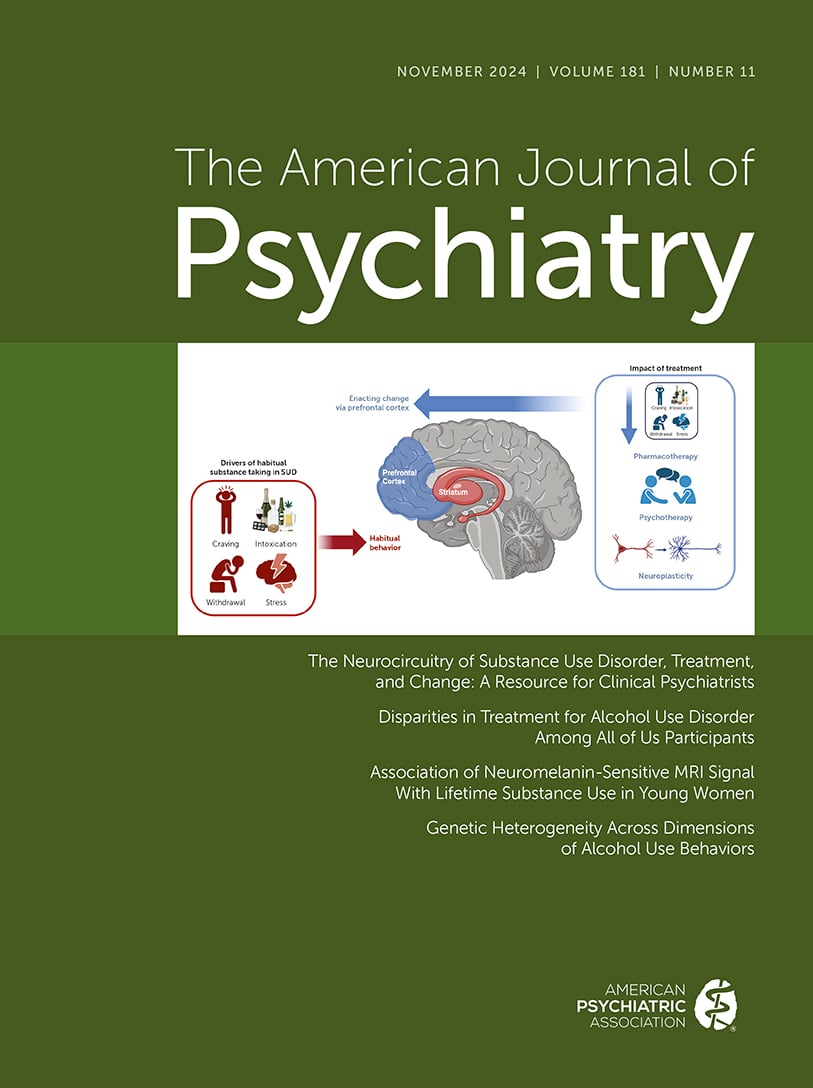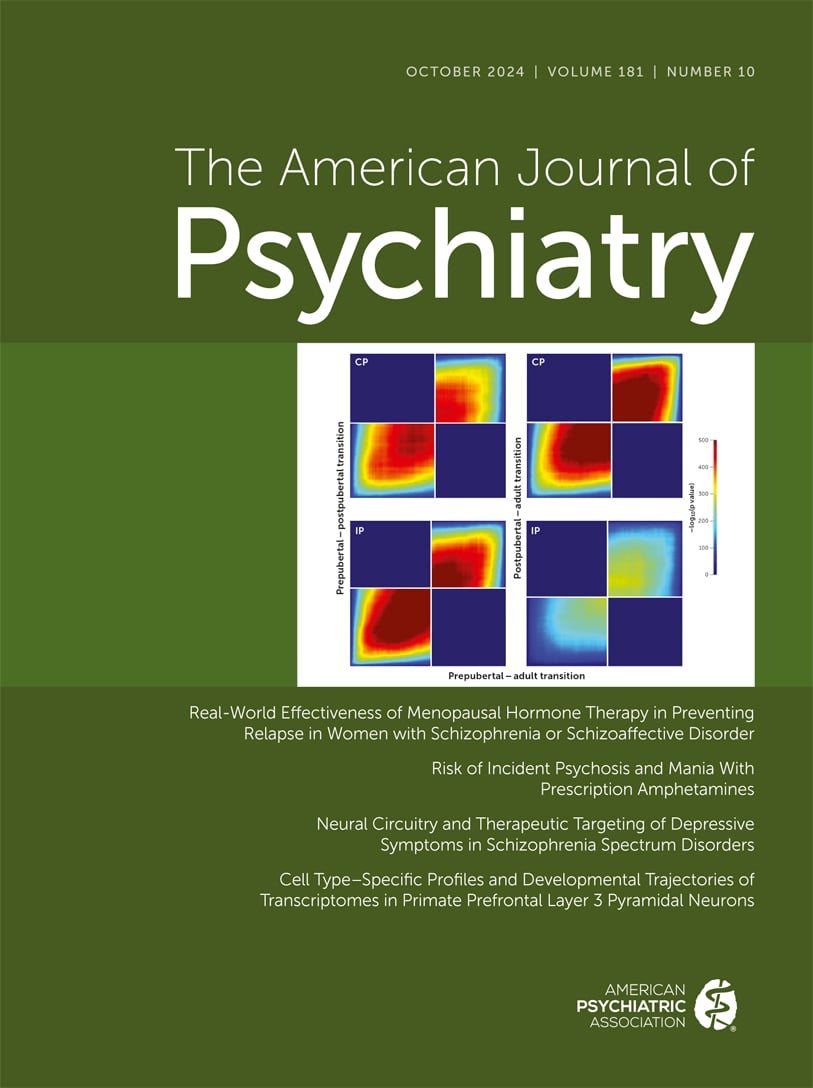American Journal of Psychiatry
- Volume 143
- Number 10
- October 1986
Publication date: 01 October 1986
Pages1205–1212Psychiatry, which has experienced the influence of many thrusts in its history, is currently experiencing the impact of neuroscience. Clinicians view the impact with excitement and with apprehension. The author reviews examples of the excitement of ...
https://doi.org/10.1176/ajp.143.10.1205Publication date: 01 October 1986
Pages1213–1221The authors discuss the biopsychosocial (systems) model of medicine formulated by George L. Engel. The interaction among systems is explained in terms of selection, negation, and the reduction of the complexity of events. In psychosocial systems, vast ...
https://doi.org/10.1176/ajp.143.10.1213Publication date: 01 October 1986
Pages1222–1227The authors examined the symptoms of 35 patients with schizotypal personality disorder. In contrast to the suggestion, based on studies of nonclinical, familial samples, that patients with schizotypal disorder are best characterized by the negative ...
https://doi.org/10.1176/ajp.143.10.1222Publication date: 01 October 1986
Pages1227–1233Neuroleptic malignant syndrome, a dangerous but little-known complication of antipsychotic drugs, is often assumed to be rare. To assess the frequency of the syndrome in a large psychiatric hospital, the authors first reviewed the literature and developed ...
https://doi.org/10.1176/ajp.143.10.1227Publication date: 01 October 1986
Pages1233–1237Concerns raised in response to proposals that general hospitals admit patients who currently receive acute care in state hospitals have focused primarily on certain assumptions about the characteristics of involuntary patients in contrast to their ...
https://doi.org/10.1176/ajp.143.10.1233Publication date: 01 October 1986
Pages1238–1244Patients who developed post-stroke depression 3 to 24 months after hospital discharge (N = 21) were compared with patients who developed depression during hospitalization (N = 26) and patients who never developed depression over 24 months of follow-up (N =...
https://doi.org/10.1176/ajp.143.10.1238Publication date: 01 October 1986
Pages1245–1249A 3-year follow-up of longtime engaged members of the Unification Church revealed remarkable compliance with the sect's unusual marital commitments. Of 305 subjects, 95% were still active in the church and 85% had been married in the interim to mates ...
https://doi.org/10.1176/ajp.143.10.1245Publication date: 01 October 1986
Pages1249–1254The authors compared the rates of treated mental illness among ethnically advantaged Ashkenazic Jews and ethnically disadvantaged Sephardic Jews in four areas of Jerusalem defined by socioeconomic status. They found that the rates of illness were higher ...
https://doi.org/10.1176/ajp.143.10.1249Publication date: 01 October 1986
Pages1255–1258Mandatory outpatient treatment invoked after the patient has improved in the hospital is a relatively new development. Tennessee instituted this policy by statute in 1981. While people placed under the constraints of that law showed a reduction in rate of ...
https://doi.org/10.1176/ajp.143.10.1255Publication date: 01 October 1986
Pages1259–1264An outpatient treatment approach directed to patients with histories of psychotically based dangerousness, poor compliance, and recidivism is described. Cases are presented that suggest favorable outcomes of this approach, but the coercive nature of the ...
https://doi.org/10.1176/ajp.143.10.1259Publication date: 01 October 1986
Pages1264–1269In the past, the legal and medical perspectives on issues relating to compulsory treatment focused on the individual's interest in liberty on the one hand and the physician's authority to treat on the other. Neither of these perspectives addresses the ...
https://doi.org/10.1176/ajp.143.10.1264Publication date: 01 October 1986
Pages1276–1279The authors analyzed data from the U.S. Bureau of Labor Statistics Level of Benefits Surveys for the period 1979-1984 to examine coverage for psychiatric disorders in the private sector. While the overall number of employees with psychiatric benefits has ...
https://doi.org/10.1176/ajp.143.10.1276Publication date: 01 October 1986
Pages1279–1282The investigation of genetic and other causes of Alzheimer's disease requires reliable and valid methods of gathering historical data on elderly relatives. To assess the reliability of the family history method in the study of late-onset dementing illness,...
https://doi.org/10.1176/ajp.143.10.1279Publication date: 01 October 1986
Pages1283–1286Twenty-two subjects 6-12 years old who met Research Diagnostic Criteria and DSM-III criteria for major depressive disorder received a fixed daily dose of nortriptyline during an 8-week protocol. Weekly plasma levels were measured; the raters performing ...
https://doi.org/10.1176/ajp.143.10.1283Publication date: 01 October 1986
Pages1287–1289An infrequently described clinical feature sometimes associated with borderline personality disorder is pseudologia fantastica, or pathological lying. The author describes four cases of pseudologia fantastica in borderline patients. Clinical, forensic, ...
https://doi.org/10.1176/ajp.143.10.1287Publication date: 01 October 1986
Pages1290–1292As part of a pilot study to assess the efficacy of propranolol in the treatment of aggression in psychiatric patients, drug interactions of propranolol with other agents were estimated by blood level monitoring. In the two patients taking a standard oral ...
https://doi.org/10.1176/ajp.143.10.1290Publication date: 01 October 1986
Pages1293–1296The authors studied two groups of adult women with histories of incest, a nonclinical sample (N = 152) and an outpatient sample (N = 53). Women in the community sample reported a range of long-term effects from the incest. The great majority said they had ...
https://doi.org/10.1176/ajp.143.10.1293Publication date: 01 October 1986
Pages1297–1300Cluster analysis of personality profiles determined by the Sixteen Personality Factor Questionnaire separated 79 patients with duodenal ulcer into three homogeneous subgroups: 32 dependent and anxious patients, 31 neurotic and anxious patients, and 16 ...
https://doi.org/10.1176/ajp.143.10.1297Article
Article
Article
Article
Article
Article
Article
Article
Article
Article
Article
Article
Article
Past Issues
View Issues Archive
Vol. 182 | No. 1

Vol. 181 | No. 12

Vol. 181 | No. 11
